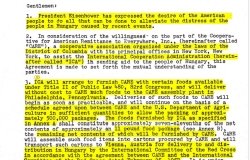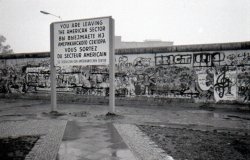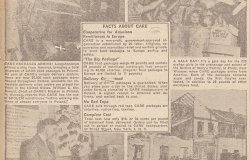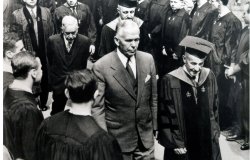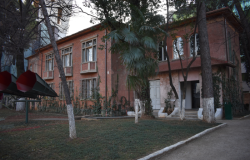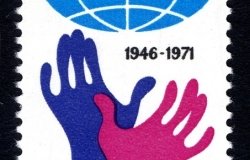Driving the Soviets up the Wall: Soviet-East German Relations, 1953-1961
Hope M. Harrison, Assistant Professor at The George Washington University, will present new findings from her upcoming book, Driving the Soviets up the Wall: Soviet-East German Relations, 1953-1961 (2003).
Overview
DRIVING THE SOVIETS UP THE wALL:
SOVIEt-EAST GERMAN RELATIONS, 1953-1961
 On Thursday, October 23, Hope M. Harrison, Assistant Professor at The George Washington University, discussed findings in her new book, Driving the Soviets up the Wall: Soviet-East German Relations, 1953-1961. Robert Litwak, Director of the International Studies Division at the Wilson Center, introduced Dr. Harrison, calling her book "a distinguished example of Cold War scholarship." Christian Ostermann, Director of the Center's Cold War International History Project commented on the books place in recent historiography.
On Thursday, October 23, Hope M. Harrison, Assistant Professor at The George Washington University, discussed findings in her new book, Driving the Soviets up the Wall: Soviet-East German Relations, 1953-1961. Robert Litwak, Director of the International Studies Division at the Wilson Center, introduced Dr. Harrison, calling her book "a distinguished example of Cold War scholarship." Christian Ostermann, Director of the Center's Cold War International History Project commented on the books place in recent historiography.
Harrison first introduced the audience to the harsh reality of the Berlin Wall through clips from CNN's Cold War Documentary series. Images of East Berliners attempting escape to the West poignantly portrayed this difficult period in German history. Harrison went on to describe the various methods of these dangerous attempts such as under the hoods of automobiles, by air balloon, or even underwater by submarine. Over 1,000 people died at the Wall during its existence.
These images set the stage for Harrison to convey the reasons she decided to study this particular part of the Cold War. She delineated two mysteries she hoped to solve: First, Harrison desired to understand the decision-making process within the walls of the Kremlin. Second, Harrison explained that she was drawn to the Wall because the division of a city seemed extremely unnatural and strange.
Coincidentally, Harrison happened to be in Berlin the day the Wall fell in 1989. As part of a Harvard student trip, she flew to Germany on November 9, 1989. She "landed into history" as the wall fell on the November 10, 1989, leaving a lasting impression on her. A few years later, Harrison became one of the first Americans allowed access to important archival evidence from the Politburo and Foreign Ministry Archives, in Moscow and Berlin. By looking at these archives Harrison "pulled back the Iron Curtain and peered into the Soviet Union" in order to analyze the relationship between Soviet Premier Nikita Khrushchev and East German leader Walter Ulbricht. Harrison also sought to provide the reader with insight to the personalities and motivations of both policy makers.
Using three case studies, Harrison's book examines the relations between these leaders in the 1950s and early 1960s. By studying the periods of Stalin's death, Khrushchev's denunciation of Stalin, and the Berlin Crisis, Harrison concluded that Ulbricht both ignored Soviet demands and forced Soviets to act. After Stalin's death, Soviets refused Ulbricht's request to close the border in Berlin and required instead that he moderate his policies so East Germans might stop leaving the country. Krushchev and other party leaders regarded the construction of the Wall as "unacceptable and simplistic." Yet, Ulbricht refused to change his policies and continued to resist Soviet demands. He blamed the population hemorrhage in East Germany on Krushchev's economic policy. After Khrushchev's "Secret Speech" at the 20th Party Congress, Ulbricht, at odds with the repudiation of Stalin and the new policy of "peaceful coexistence," found an ally in Chinese Chairman Mao Zedong. Playing up the differences between Mao and Khrushchev, Ulbricht took advantage of the burgeoning Sino-Soviet split and threatened to side with China against the Soviet Union. Fearing loss of leadership within the communist camp, Khrushchev relaxed his policies toward East Germany
Harrison emphasized the influence of the "frontline" mentality held by both superpowers. Berlin served as the cornerstone for the socialist system and Americans regarded Berlin as the "super domino" in Western Europe. Khrushchev and the Soviets saw East Germany as key to the triumph of communism. If East Germany collapsed, the Soviet system would lose face in the global theater. In 1961, Khrushchev reassured Ulbright that "East German needs are our needs." Thus, Ulbricht would receive what he wanted from the Soviets to preserve and protect East Germany. At the same time, West Germany served as the showcase of capitalism. It also held importance for the United States, and, at the Vienna Conference, Kennedy strongly emphasized that the status of Berlin could not be compromised. With pressure from arrogant and opportunistic Ulbricht, Khrushchev decided to go ahead with the construction of the Wall.
Harrison explained that her book provided a new lens by which to look at the Cold War. In focusing on the influence of seemingly lesser powers, in this case East Germany, Harrison was able to show that the Wall was not part of a Soviet anti-Western initiative. Rather, the Soviet Union moved cautiously so as not to aggravate the West. Harrison reveals that it was Ulbricht who forced Khrushchev to back the construction of the Wall. Other authors had noted the influence of East German leadership on the Kremlin, but Harrison's book carefully analyzes this relationship through recently declassified documents.
Christian Ostermann commended Harrison for her "breathtaking archival research" and called the book a "seminal book for Soviet history" during this period. Harrison spent months committed to archival research, not only in finding relevant documents but translating those documents from German and Russian. Ostermann also noted that the Harrison's book clarified the confusion of November 9, 1989 with "all the drama and intensity it deserved."
The event was organized by the Cold War International History Project and co-sponsored by the International Studies Division, the Kennan Institute, the George Washington Cold War Group, and the American Institute for Contemporary German Studies at The Johns Hopkins University.
Mircea Munteanu, Cold War International History Project Assistant
Drafted by Ashton Giese, Outreach and Communications and Carmina Sicangco, CWIHP
Documents & Downloads
Hosted By

Cold War International History Project
The Cold War International History Project supports the full and prompt release of historical materials by governments on all sides of the Cold War. Through an award winning Digital Archive, the Project allows scholars, journalists, students, and the interested public to reassess the Cold War and its many contemporary legacies. It is part of the Wilson Center's History and Public Policy Program. Read more
Thank you for your interest in this event. Please send any feedback or questions to our Events staff.
